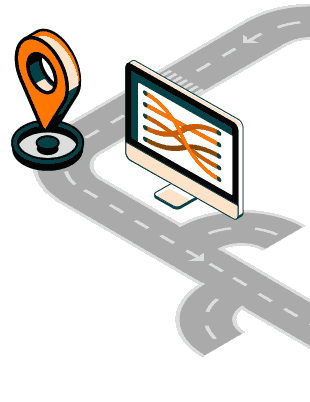Download inQuba Cumulate Case Study
Download inQuba Sanlam Case Study
Why Journey Maps Fail to Deliver Journey Management
Where to use Journey Management vs Journey Mapping.
BLOG
Read Now
Bruce Eidsvik
inQuba President, North America
Bruce is a seasoned executive with over 25 years of experience in sales and marketing mainly within the customer experience space. Bruce has held senior executive roles at Genesys, a private equity backed cloud customer experience company and OpenText, a NASDAQ listed information management company, where he led their Global Growth Marketing and Sales Development organizations. Prior to these roles, Bruce was the Managing Director for the APAC region at Genesys, based out of Singapore. Bruce is also an entrepreneur and a co-founder of Insight Venture backed VoiceGenie Technologies Inc, which was successfully exited in 2006.
This work has led Bruce to points around the globe, helping both Fortune 100 and SMBs alike. Bruce is a frequent keynote speaker at CX events worldwide, where he is more than happy to share his experiences and best practices to help others. Bruce is a team builder, has a passion for driving creativity, developing leaders and getting stuff done. Bruce strongly believes that fun is an important component of driving great results. Outside of work, Bruce is an avid skier, road and mountain biker, triathlete and in love with the mountains.
Bruce holds a Bachelors of Science degree with Honors in engineering physics from Queen’s University. After 14 years abroad, Bruce and his family are back in Canada and living just outside Banff, Alberta.
Liza Rogers-Nolte
Head: Inside Sales SA and Marketing
Liza joined inQuba shortly after inception in 2011. She has held various roles and responsibilities during the time and has been vital to the success of the business. Since 2016, Liza has headed up inQuba’s global Inside Sales function, responsible for identifying, qualifying and nurturing new business relationships. She also plays a fundamental role within inQuba’s marketing function, being jointly responsible for all key, global marketing events. Liza also manages the relationships of inQuba Partners, specifically the Microsoft Partner Relationship for which she is the MSFT Alliance Partner Manager.
Prior to inQuba, Liza spent over 10 years in London (UK) gaining international experience in various industries. This included working closely with top executives in FTSE 250 and blue-chip companies in industries such as banking, private equity, investment property, executive search, and others.
Prinay Panday
Head: BI and DevOps
Prinay is responsible for overseeing all IT operations, technical delivery and technical strategy for inQuba, ensuring alignment with the company’s business requirements and goals. Prinay is responsible for assisting other departments within inQuba, such as Product, Development and Professional Services, in utilising technology efficiently and profitably. He also spent several years in software development at inQuba which has provided him with deeper insight into effective technical delivery and operations of the inQuba platform. Prior to joining inQuba, Prinay worked in IT operations and software development across various industries including insurance, banking and retail. Prinay holds a Bachelor of Science in Information Technology from the University of Johannesburg.
Dasha Naidoo
Head: Product Experience
Dasha joined inQuba in 2013 and has held various positions over the years. Dasha found her niche when she joined the core Product team in designing the inQuba CX platform. As the Head of Product Experience, she is ultimately responsible for the overall user experience and value delivery to inQuba’s customers. Dasha has been instrumental in the product’s success, providing insight into design, customer behaviours and practical solutions to complex customer challenges. Before joining the product team, she spent 2 years guiding customers through their Customer Experience programmes.
With a professional career spanning 10+ years, Dasha has extensive experience across CX, Marketing, Campaign management and Data management and analysis. Dasha holds a Bachelor of Commerce (Information Systems Technology) degree from the University of KwaZulu Natal.
Kobus Snyman
Head: Service Operations
Kobus is responsible for overseeing all technical operations including customer support and general operations activities ensuring the inQuba’s customer platform is optimal and stable. He has extensive Systems and Business Analysis experience gained from industries such as Banking, Information Technology and Mining. He has gained solid knowledge in Project Management, Disaster Recovery and Business Continuity management as he managed the Disaster Recovery site for one of South Africa’s Big Four Banks for a significant period. In 2016, Kobus joined inQuba as a Senior Analyst and has subsequently been promoted to Head: Service Operations, bringing with him the technical platform knowledge as well as customer management experience gained through the management of large, strategic inQuba clients. Kobus holds a Certificate in IT Service Management (ITIL) and SDIP. He also holds an ‘Essential skills for the Business analyst’ certification.
Eben Odendaal
Head: Professional Services
Eben is responsible for the successful delivery of inQuba’s CX solution programmes to clients. He is an experienced Business Consultant and Project Manager and has delivered multiple Management Consulting, Digital Application and Software Development programmes, across multiple industries, throughout his career. Eben holds a Mechanical Engineering degree from the University of Pretoria, an MBA from the University of Stellenbosch and is a registered Project Management Professional.
Allan Lee Son
Senior Software Architect
Allan is a Senior Architect in the core team working on the architecture and development of the inQuba CX platform for over six years. As a technical lead, product designer and software architect, he is a driving force in the inQuba Product Development team, providing insight into design and practical solutions to complex software challenges.
Previous to joining inQuba, Allan’s five years at On-IT-1, developing software solutions for the Bosasa Group, have given him broad perspective on design, development and deployment of software applications across various industries, including aquaculture, youth rehabilitation, fleet management and device integrations for biometric and programmable logic controllers. Allan brings this valuable experience to bear on the challenges of developing a globally distributed SaaS platform.
Allan completed his treatise in 2006 and holds a honours degree in Bachelor of Commerce (Computer Science and Information Systems) from the Nelson Mandela University.
Warren Reed
Senior Software Architect
Warren is responsible for high-level software design choices and selecting the best tools, platforms, and technologies for developing and delivering inQuba’s CX software platform. He helped build the inQuba platform from the ground up, including products such as Engage, Case Management, and Journey Analytics. He implemented the continuous delivery pipeline that automatically deploys inQuba’s software solutions globally. Prior to inQuba, he spent five years at Bosasa architecting and developing systems for vehicle maintenance, youth development centres, access control security, and job recruitment. He also spent two years at Korbitec developing legal practice management software. Warren holds an honours degree in Computer Science and Information Systems from the Nelson Mandela University.
Jon Salters
Non-Executive Director
Jon brings with him a wealth of experience in market research and technology enabled services in the insights domain.
Prior to being strategic advisor to inQuba, Jon spent four years at Vision Critical, the world’s leader in Insight Community solutions where he launched Vision Critical’s presence in Africa, re-launched their partner program internationally and was also integrally involved in the team that executed the spin-off of Vision Critical’s Research and Consulting business unit which became a cornerstone of the newly formed Maru Group.
Jon holds a GDE in Engineering Management and a B.Sc Mechanical Engineering (industrial Option) for the University of the Witwatersrand.
Antony Adelaar
Head: Product Marketing
Antony joined the inQuba story early, towards the end of 2011. He is responsible for the planning, design, production, marketing and release of inQuba’s CX software solutions to customers on 4 continents. Prior to managing product, Antony oversaw the account management team who in turn oversee inQuba clients using the full range of inQuba CX solutions.
Antony has ten years’ experience in market research across the African continent and across all major industries. Prior to inQuba, he headed up digital research at an agency, Yellowwood Future Architects, which specialises in strategy, research and design.
Antony completed post-graduate Leadership Development studies at Gordon Institute of Business Science (GIBS), following a Bachelor’s degree (Industrial Psychology) at the University of South Africa.
Trent Rossini
Co-Founder & CEO inQuba
Trent is responsible for all operational delivery, professional services engagement, product conceptualisation and delivery of inQuba software. Prior to joining inQuba, Trent was the CIO for Discovery Health and in 2003, was appointed as COO of PruHealth, Discovery’s UK joint healthcare venture with Prudential. He also spent several years consulting on various systems integration projects for Deloitte and Accenture.Trent holds a B.Sc.(Mech) Engineering from the University of the Witwatersrand and a Graduate Diploma in Industrial Engineering.
Micheal Renzon
Co-Founder & CEO inQuba North America
Michael Renzon is an entrepreneur and visionary and the driving force behind highly successful internet, technology, content and Customer Experience companies. He is an Endeavor Entrepreneur, the leading high-impact entrepreneurship movement around the world, and was named the Most Promising Entrepreneur of Entrepreneur Organization (EO) in 2006.
Michael’s thought leadership in Customer Experience and Customer Journey Management has been adopted by leading companies around the world who use inQuba’s analyst-rated Customer Journey SaaS Platform and Methodology to drive their customer experience transformation and customer journey optimization.
Michael holds an MBA from the University of Cape Town, an Honours Degree in Computer Science and a Bachelor of Economic Science Degree, both from the University of the Witwatersrand.
<h4>Link to CX series</h4>
[fc id=’16’][/fc]
Please fill in your name and email to subscribe to inQuba’s newsfeeds.
Download inQuba Social Product Paper
Download inQuba Case Management Product Paper
Download inQuba Engage Product Paper
Download inQuba CX Product Paper
Download Customer Experience Architecture
Download Enhancing Sales Performance
Download Unlocking Profit
Download Why the customer journey needs to be CXtended
Download Reinventing Retail
Download Digital Disruption: the Insurance of Things & CX
Download inQuba TIBCO Case Study
Download inQuba Kulula/Comair Case Study
[contact-form-7 404 "Not Found"]Download inQuba VitalityLife Case Study
Download inQuba Comair Case Study
Download inQuba B2B Telecommunications Report
Download inQuba Telkom Case Study
Download inQuba Hollard Case Study
Download inQuba Liberty Case Study
Download inQuba Momentum Case Study
Download inQuba Coronation Case Study
Download inQuba African Bank Case Study
Download inQuba Healthcare Report
















 Reduced dev dependency
Reduced dev dependency Intervention clarity
Intervention clarity Quick iteration
Quick iteration Real ROI
Real ROI Speed to insight
Speed to insight












